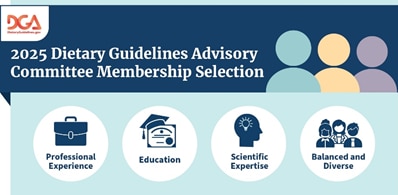Posted June 14, 2022
Overview
Today, the U.S. Departments of Health and Human Services (HHS) and Agriculture (USDA) announced the public call for nominations to the 2025 Dietary Guidelines Advisory Committee (Committee). The Committee will review scientific evidence to help inform the Dietary Guidelines for Americans, 2025-2030 (Dietary Guidelines). The Departments will seek to appoint a Committee that is balanced in expertise, experience, and education, and is reflective of the racial, ethnic, gender, and geographic diversity within the United States. Members of the public are invited to submit nominations for themselves or other qualified experts by July 15, 2022 at 11:59 PM E.T.
“The science reviewed by the Dietary Guidelines Advisory Committee provides an essential foundation for the Dietary Guidelines for Americans,” said Adm Rachel L. Levine, M.D., Assistant Secretary for Health at HHS and head of the U.S. Public Health Service Commissioned Corps. “The Committee’s review ensures that the Dietary Guidelines is based on sound scientific evidence and serves to enhance the health and well-being of all Americans.”
“Our goal is to appoint a committee that will make science-driven, dietary recommendations with health equity in mind,” said Stacy Dean, Deputy Under Secretary for Food, Nutrition, and Consumer Services at USDA. “We are committed to bringing together interdisciplinary experts with a variety of professional experience who will ensure that the guidance in the Dietary Guidelines for Americans is inclusive of the U.S. population.”
The Committee will provide independent, science-based advice and recommendations to be considered by HHS and USDA, along with Federal agency input and public comments, as the Departments develop the Dietary Guidelines for Americans, 2025-2030. The Committee’s evidence review will focus on diet and health outcomes across the lifespan, including the relationship between diet and risk of overweight and obesity with a new emphasis on weight loss and weight maintenance for adults. Importantly, a health equity lens will be applied across the evidence review to ensure factors such as socioeconomic status, race, ethnicity, and culture are described and considered to inform resulting guidance. The Committee will use 3 approaches to examine the evidence: Nutrition Evidence Systematic Review (NESR) systematic reviews, food pattern modeling, and data analysis. Each of these approaches has its own rigorous, protocol-driven methodology, and plays a unique, complementary role in examining the science.
The Committee will collaborate to review the latest scientific evidence and develop science-based recommendations. Full details on candidate requirements are available on DietaryGuidelines.gov.

About the Dietary Guidelines
The Dietary Guidelines for Americans provides advice on what to eat and drink to meet nutrient needs, promote health, and prevent disease. It provides a customizable framework for healthy eating that can be tailored and adapted to meet personal, cultural, and traditional preferences. Additionally, the Dietary Guidelines forms the basis of federal nutrition policies and programs and is used by professionals to support nutrition education efforts.
For more information on the Dietary Guidelines and the Advisory Committee visit DietaryGuidelines.gov.

Comments (0)